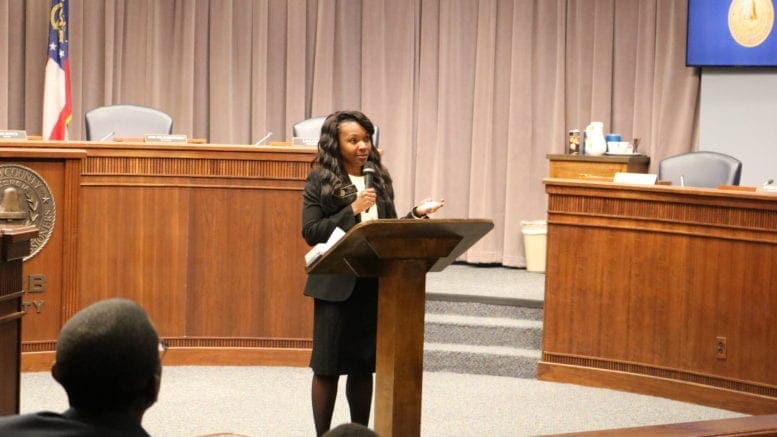by Cobb County District 4 Commissioner Lisa Cupid
[This article was published on the Georgia First Amendment Foundation website, and is reprinted with the permission of Commissioner Cupid]
After serving for five years as a Cobb County commissioner, I still feel the ongoing tug of balancing life as an elected official and a citizen. I can recall the days of needing help from my local government and not feeling that I received an adequate response. Now that I serve in government, I know just how much I want to help and how limited resources of time, money and staff sometimes can be.
One area where my positions as a citizen and an elected official fully align is in my support for government transparency. Transparency helps citizens get information they need, and it also helps elected officials get out information about what we are doing, how we are doing it and why.
The process of transparency is often adversarial. Instead of citizens and elected officials working together to get to the bottom of a matter, transparency is often hampered by a presumption of conflict that gets everyone off on the wrong foot. Requesters of information may think that elected leaders always have something to hide. Elected officials and even government staff may be frustrated by requests that seem too broad or seem to make demands without regard for courtesy.
Let me be clear: Information that is accessible to the public under Georgia law and the First Amendment to the U.S. Constitution must be provided by government entities without exception. Even if the request is broad or demanding. Still, if you are a citizen or journalist making a request, the way you ask for information can actually improve the likelihood of getting relevant information as soon as possible.
___________________________________________________________
Watch a video of Commissioner Cupid discussing the importance of good communication when seeking public information.
___________________________________________________________
So, what’s behind our transparency process problem? In my experience, there are a few causes.
There might truly be bad intent on behalf of those requesting information or those with a desire to withhold it. But this is actually the least common of all the causes I’ve witnessed.
- More often, a request for information might take a long path to the right source. As an elected official, I often get requests for information from constituents, and while I am happy to help them, the quickest route would be to for them to walk into or call the county clerk’s office. Making the request of those closest to the documentation will almost always yield a more thorough and faster response.
- A problem with transparency also might be caused by a downright lack of knowledge about the law. Georgia’s Open Records Act and Open Meetings Act are long and complex. That’s why the Georgia First Amendment Foundation produces a citizen’s guide to the state’s Sunshine Laws. Even though I am a foundation board member, lawyer and two-term elected official, I have found myself in the awkward position of not knowing that an action taken by the board of commissioners was in violation of the Open Meetings Act. I’m confident many other public officials have had the same experience.
- By far, most transparency issues emerge from miscommunication or from challenging exchanges between those seeking information and those charged with providing it.
So, what can we do to smooth and simplify the flow of public information?
If you are a citizen or journalist, ask for help — not just in receiving information, but also in how to ask for it clearly and concisely. Go to the clerk’s office, email the planning department, call the staff person who administers a program in which you are interested. Tell them what you would like to know and ask for guidance on the most efficient way to get that information. Most of us in public service feel we are called to help. Requests framed with that understanding appeal to the very core of why we are in our respective positions: to serve the public good.

Board member and Cobb Commissioner Lisa Cupid (L) attends
a 2016 open government training session at Kennesaw State
(photo from the GFAF website)
Become versed in Georgia’s open government laws so you can identify whether access to information is being intentionally or ignorantly subverted. Check out the foundation’s tips for requesting public information, as well as our Red Book, A Citizen’s Guide to Open Government, mentioned above. In addition, look for opportunities for in-person training; our foundation experts lead or participate in several government transparency training sessions throughout the year. If you don’t already receive our training schedules and updates, email us at info@gfaf.org and ask to be added to the list.
If you are a government employee or elected official, seek out information and training sessions — including refresher courses — to ensure you understand transparency laws and have current knowledge. Again, the foundation is a great resource. Check out not only the Red Book, but also the Blue Book, Georgia Law Enforcement and the Open Records Act. The foundation provides in-person open government training to agencies, as well; email us at info@gfaf.org to learn more.
In today’s climate of political contentiousness and “fake” news, it can be wise to go to the original source of public information. The foundation’s efforts help support a free flow of facts that creates more informed citizens and more engaged and responsive elected officials. Whether you’re an interested citizen, an elected official — or, as in my case, both — that is help we all can benefit from.
